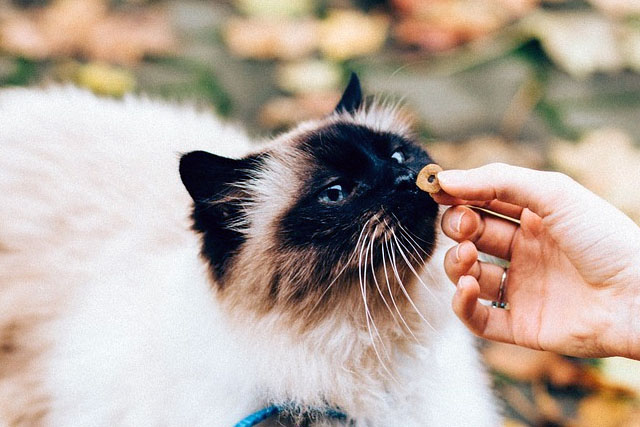



Cats are beloved pets that bring joy and companionship to our lives. As responsible pet owners, it is important to ensure that our feline friends are healthy and happy. One way to support their overall well-being is by incorporating natural supplements into their diet. Natural supplements for cats can provide a range of benefits, from improving their immune system to promoting healthy digestion. In this article, we will explore the top recommendations for natural supplements for cats.
Omega-3 fatty acids are essential nutrients that play a crucial role in maintaining a cat's overall health. These fatty acids are known for their anti-inflammatory properties, which can help reduce joint pain and inflammation in cats with arthritis. Omega-3 fatty acids also support a healthy coat and skin, reducing the risk of dryness and itchiness.
One of the best sources of omega-3 fatty acids for cats is fish oil. Look for a high-quality fish oil supplement specifically formulated for cats. It is important to follow the recommended dosage to avoid overdosing your cat with these beneficial fatty acids.
Probiotics are beneficial bacteria that promote a healthy gut flora in cats. They help maintain a balanced digestive system and support optimal nutrient absorption. Probiotics can be especially beneficial for cats with digestive issues, such as diarrhea or constipation.
When choosing a probiotic supplement for your cat, look for one that contains a variety of beneficial bacteria strains, such as Lactobacillus and Bifidobacterium. These supplements are typically available in powder or capsule form, and can easily be mixed with your cat's food.
Digestive enzymes are essential for breaking down food and facilitating nutrient absorption. Cats naturally produce digestive enzymes, but sometimes they may need additional support, especially as they age or if they have digestive disorders.
Supplementing your cat's diet with digestive enzymes can help improve digestion and alleviate symptoms such as bloating and gas. Look for a digestive enzyme supplement specifically formulated for cats, and follow the recommended dosage instructions.
Cranberry extract is a natural supplement that can help support urinary tract health in cats. It contains compounds that prevent bacteria from adhering to the walls of the urinary tract, reducing the risk of urinary tract infections.
If your cat is prone to urinary tract issues, incorporating cranberry extract into their diet can be beneficial. Look for a cranberry extract supplement that is specifically formulated for cats, and follow the recommended dosage instructions.
Milk thistle is a herb that has been used for centuries to support liver health. It contains a compound called silymarin, which has antioxidant and anti-inflammatory properties. Milk thistle can help protect the liver from toxins and promote its regeneration.
If your cat has liver issues or is on long-term medication that may affect liver function, incorporating milk thistle into their diet can be beneficial. Look for a milk thistle supplement that is specifically formulated for cats, and follow the recommended dosage instructions.
Glucosamine and chondroitin are natural compounds that support joint health and mobility. They are commonly used in supplements for cats with arthritis or joint pain. Glucosamine helps to rebuild cartilage, while chondroitin helps to reduce inflammation and improve joint function.
If your cat is showing signs of joint stiffness or has been diagnosed with arthritis, incorporating a glucosamine and chondroitin supplement into their diet can help alleviate their symptoms. Look for a supplement that is specifically formulated for cats, and follow the recommended dosage instructions.
L-Lysine is an amino acid that plays a crucial role in supporting a cat's immune system. It helps to prevent and manage feline herpes virus infections, which can cause respiratory issues and eye problems in cats.
If your cat has a history of feline herpes virus infections or is prone to respiratory issues, incorporating L-Lysine into their diet can be beneficial. Look for a L-Lysine supplement that is specifically formulated for cats, and follow the recommended dosage instructions.
Chamomile is a herb that has calming properties and can help reduce anxiety and stress in cats. It can be particularly beneficial for cats that are prone to anxiety or have difficulty adjusting to new environments or situations.
You can incorporate chamomile into your cat's diet by brewing a chamomile tea and adding a small amount to their water or food. Alternatively, you can find chamomile supplements specifically formulated for cats.
Valerian root is another herb that has calming properties and can help reduce anxiety and promote relaxation in cats. It can be particularly beneficial for cats that experience anxiety during car rides or vet visits.
You can find valerian root supplements specifically formulated for cats. It is important to follow the recommended dosage instructions, as too much valerian root can have the opposite effect and make your cat overly sedated.
Catnip is a well-known herb that can have a stimulating effect on cats. It can help alleviate stress and anxiety, and provide mental and physical stimulation for your cat. Catnip can be particularly beneficial for indoor cats that may not have access to outdoor stimulation.
You can find catnip in various forms, such as dried leaves or as an ingredient in cat toys. It is important to note that not all cats are affected by catnip, as sensitivity to its effects is genetic.
In conclusion, incorporating natural supplements into your cat's diet can provide a range of benefits for their overall health and well-being. From supporting joint health to promoting a healthy immune system, these supplements can help address specific health concerns and improve your cat's quality of life. However, it is important to consult with your veterinarian before introducing any new supplements to your cat's diet, as they can provide guidance on the appropriate dosage and potential interactions with other medications.
Related posts